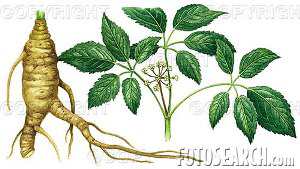Ginseng
Herbal Remedies and Medicinal Cures for Diseases, Ailments & Illnesses that afflict Humans and Animals
Aloe Vera •
Astragalus •
Bankoro •
Bilberry •
Bitter Gourd (Ampalaya) •
Bitter Orange •
Black Cohosh •
Cat's Claw •
Chamomile •
Chasteberry •
Coconut •
Cranberry •
Dandelion •
Echinacea •
Ephedra •
European Elder Tree •
Evening Primrose •
Fenugreek •
Feverfew •
Flaxseed •
Garlic •
Ginger •
Ginkgo •
Ginseng (Asian) •
Golden Seal •
Grape Seed •
Green Tea •
Hawthorn •
Hoodia •
Horse Chestnut •
Kava •
Lavender •
Licorice •
Malunggay Moringa Oleifera •
Milk Thistle •
Mistletoe •
Passion Flower •
Peppermint Oil •
Red Clover •
Ringworm Bush (Akapulko) – Cassia alata •
Saw Palmetto •
St. John's Wort •
Tawa Tawa •
Turmeric •
Valerian •
Yohimbe •
accept the bitter to get better
 Ginseng Root | |||
 Red Ginseng Root | |||
| |||
 Ginseng Root and Plant | |||
| |||
Ginseng
The medicinal herb Ginseng (Asian) as an alternative herbal remedy - Asian ginseng is native to China and Korea and has been used in various systems of medicine for many centuries. Asian ginseng is one of several types of true ginseng (another is American ginseng, Panax quinquefolius). An herb called Siberian ginseng or eleuthero (Eleutherococcus senticosCommon Names--Asian ginseng, ginseng, Chinese ginseng, Korean ginseng, Asiatic ginseng
Latin Name--Panax ginseng Picture of Ginseng (asian)
- Asian ginseng (Panax ginseng) has been used medicinally in Asia for more than 5,000 years. Ginseng is said to promote Yang energy and is characterized by the presence of ginsenosides. Ginsenosides have been studied for their numerous health-supporting abilities. In recent times, Panax ginseng has been shown to support general well-being, as well as support the cardiovascular system and help sustain hormonal balance. (Forgo I, Kayasseh L, Staub JJ. "Effect of a standardized ginseng extract on general well-being, reaction capacity, pulmonary function and gonadal hormones" [German]. Medizinische Welt 1981; 32(19): 751-756 (English translation of German paper, with additional French summary). Further animal studies have investigated the long-term benefits of Panaxginseng with regards to life span. (Bittles AH, Fulder SJ, Grant EC, et al. "The effect of ginseng on the lifespan and stress responses in mice". Gerontology. 1979;25:125-131).
- Red ginseng (Also known as Panax ginseng and Korean ginseng) is one of the most prized and expensive Chinese herbs.
What Ginseng Is Used For
- Treatment claims for Asian ginseng are numerous and include the use of the herb to support overall health and boost the immune system. Traditional and modern uses of ginseng include:
- Improving the health of people recovering from illness
- Increasing a sense of well-being and stamina, and improving both mental and physical performance
- Treating erectile dysfunction, hepatitis C, and symptoms related to menopause
- Lowering blood glucose and controlling blood pressure.
Herbal Remedy Products with Ginseng as part of the ingredients
- AdaptoZen™ - Herbal remedy supports balance and promotes resistance to physical, chemical & biological stressors
- Supports the body’s ability to withstand change and maintain balance
- Supports balance in the cardiovascular system
- Supports balanced pH and alkalinity in the stomach
- Supports harmony throughout the digestive system
- Supports balance in the thyroid and endocrine system
- Supports balance in the respiratory system
- Supports adrenal balance
- Supports health in the brain and nervous system
- Supports equilibrium, health and vitality as the body deals with the natural process of aging
- Supports healthy physiological functioning of the body
- Focus ADDult™ - Herbal remedy proven to relieve symptoms of adult attention deficit disorder
- Improves adult concentration
- Boosts memory functioning
- Improves attention span
- Increases motivation and energy
- Reduces distractibility
How Ginseng Is Used
The root of Asian ginseng contains active chemical components called ginsenosides (or panaxosides) that are thought to be responsible for the herb's medicinal properties. The root is dried and used to make tablets or capsules, extracts, and teas, as well as creams or other preparations for external use.
What the Science Says about Ginseng
- Some studies have shown that Asian ginseng may lower blood glucose. Other studies indicate possible beneficial effects on immune function.
- To date, research results on Asian ginseng are not conclusive enough to prove health claims associated with the herb. Only a handful of large clinical trials on Asian ginseng have been conducted. Most studies have been small or have had flaws in design and reporting. Some claims for health benefits have been based only on studies conducted in animals.
- NCCAM is supporting research studies to better understand the use of Asian ginseng. NCCAM is studying how Asian ginseng interacts with other herbs and drugs and exploring its potential to treat chronic lung infection, impaired glucose tolerance, and Alzheimer's disease.
Side Effects and Cautions of Ginseng
- When taken by mouth, ginseng is usually well tolerated. Some sources suggest that its use be limited to 3 months because of concerns about the development of side effects.
- The most common side effects are headaches and sleep and gastrointestinal problems.
- Ginseng can cause allergic reactions.
- There have been reports of breast tenderness, menstrual irregularities, and high blood pressure associated with ginseng products, but these products' components were not analyzed, so effects may have been due to another herb or drug in the product.
- Ginseng may lower levels of blood sugar; this effect may be seen more in people with diabetes. Therefore, people with diabetes should use extra caution with Asian ginseng, especially if they are using medicines to lower blood sugar or taking other herbs, such as bitter melon and fenugreek, that are also thought to lower blood sugar.
- It is important to inform your health care providers about any herb or dietary supplement you are using, including Asian ginseng. This helps to ensure safe and coordinated care.